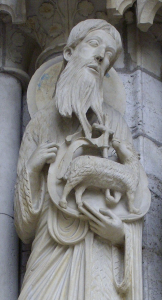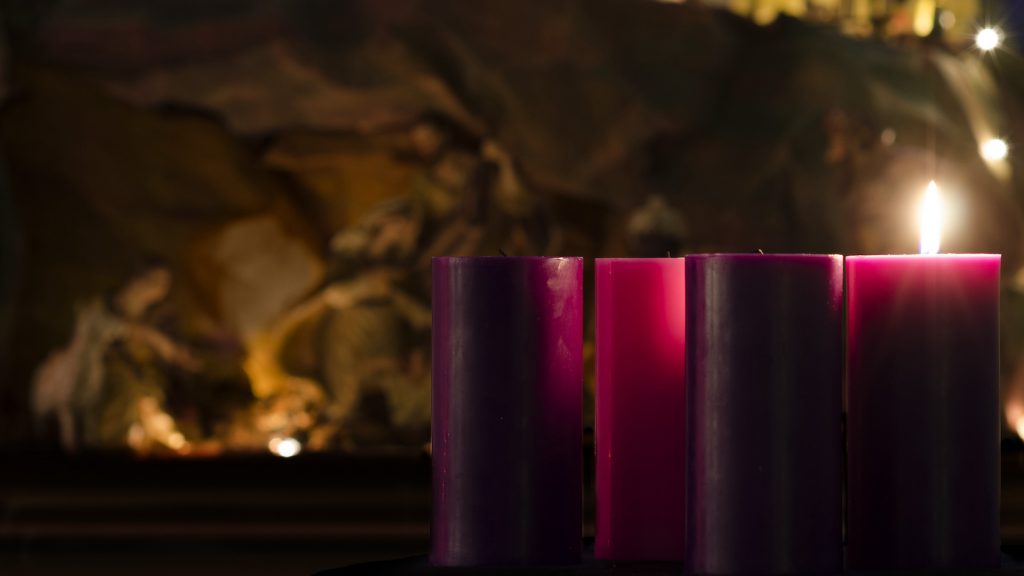One of my favorite places on earth is the great Cathedral of Chartres, located about an hour by train south of Paris. For me, it represents the richest expression of Gothic architecture, and the Gothic is, again for me, the most religiously evocative type of architecture. When I was a doctoral student in Paris many years ago, I would journey as often as I could to Chartres, and each time that I approached the building, I did so, not in the manner of tourist, but as a seeker coming to the end of a pilgrimage.
Chartres is famous, of course, for its transcendently beautiful stained glass, but it also boasts hundreds of exquisitely rendered sculptures of biblical figures. On the north porch of the cathedral, there is a statue that I particularly savor. It is a depiction of John the Baptist, and it shows him as an emaciated figure (after all, the Bible tells us that he ate locusts and wild honey) holding an image of the Lamb of God. But what is most striking about the sculpture is the face of the Baptist. He bears an expression that bespeaks an aching, a longing, a looking toward something that he does not have but wants. Some of the saints that surround Chartres Cathedral seem blissful, already in possession of the great good for which they longed. But not John the Baptist. He yearns, pines, hungers still.

And this makes him, par excellence, a saint of Advent. This holy season, of course, calls to mind the coming (adventus) of Jesus in history, but it also anticipates the arrival of the Lord at the culmination of the age, that time when, as St. Paul puts it, Christ will be “all in all” (1 Cor. 15:28). This fulfillment, obviously enough, has not yet happened, for the world is still plagued by wars, famine, floods, earthquakes, and pandemics. And our lives are still marked by depression, failure, sin, and frustrated plans. None of this tells against the fact that God’s creation is good, but it does indeed confirm the intuition that this life is, as the Salve Regina puts it, “a vale of tears.” All of us, therefore, wear the expression of the John the Baptist of Chartres: craving an absent good.
Might I suggest some practices for all of us Advent people during these upcoming weeks? First, we should deepen our lives of prayer. As John of Damascus told us long ago, to pray is to “raise the mind and the heart to God.” It is to be consciously aware of God, present to him. Even if we wear a somewhat anguished expression as we do so, we should turn our faces purposely to God, and as we pray, we should allow our yearning for God to surface. C.S. Lewis told us that the aching of the heart for God—and it is a real suffering—is properly called “joy.” Prayer, in a way, is the cultivation of precisely that sublime form of joy. One of the very best ways to practice this form of spiritual attention is to spend an uninterrupted hour or half hour in the presence of the Blessed Sacrament.
A second Advent suggestion is this: wear the world lightly. The reason that we feel spiritual anguish is that the deepest desire of our heart cannot be met by any merely worldly good. We look to something beyond our ken and capacity precisely because we realize, consciously or unconsciously, that the hungry soul cannot be satisfied by any amount of esteem, riches, power, or pleasure. The attainment of any of these goods produces a momentary bliss followed by a letdown, a disappointment. But this truth mustn’t be allowed to depress us; rather, it should compel us to adopt the spiritual stance that the spiritual masters call “detachment.” This means enjoying wealth and then letting it go; using power for good but not clinging to it; taking in honor and not caring a whit for it. It is to adopt the attitude that St. Ignatius of Loyola calls “indifference.” Advent is a privileged time to practice this virtue.
A third and final suggestion is this: we should devote ourselves to doing one of the corporal works of mercy. These acts—feeding the hungry, giving drink to the thirsty, clothing the naked, visiting the imprisoned, etc.—are concrete acts of love. It is easy enough for religious people to speak of love in an abstract manner, but to love means to will the good of the other. Therefore, it is dense, real, particular, something that shows up. And heaven—that ultimate joy that we long for—is nothing other than love, love in the fullest possible sense, love without limit. Aquinas says that in heaven, faith will fade away (since we will see God face to face) and hope will disappear (since we would have attained what we hoped for), but love will remain (since heaven is love). So, when we love someone here below, in even the simplest way, we anticipate our return to the homeland, we stir our craving for heaven.
So, as we move into the spiritual space of John the Baptist, as we enter the season of Advent, we should pray, we should let go, and we should perform the works of mercy.

